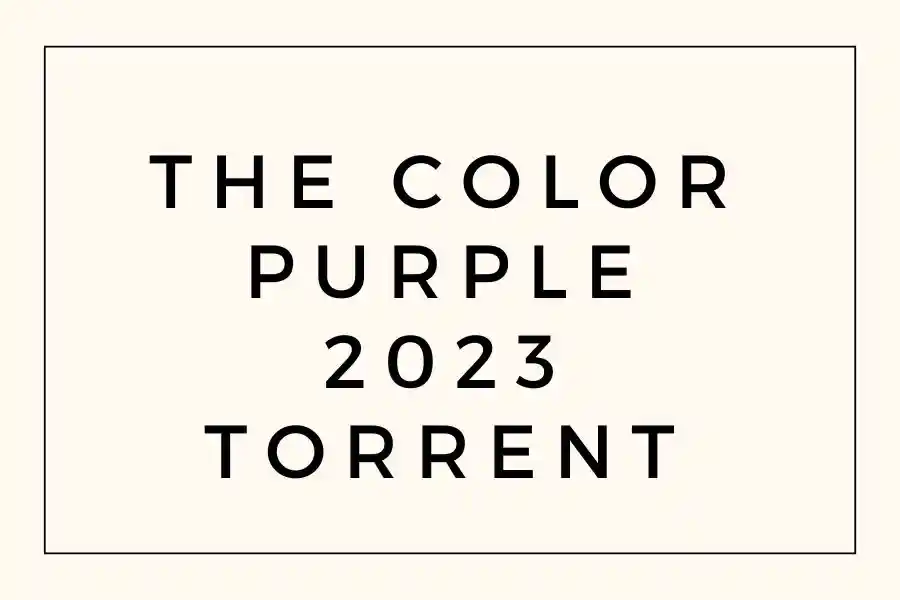The Color Purple 2023 Torrent: An In-Depth Look

Torrents have revolutionized how we access media, from movies and music to books and software. The 2023 adaptation of “The Color Purple,” a story of profound cultural and literary significance, is no exception. However, torrenting copyrighted material like this has complex ethical implications worth examining.
The Legacy of The Color Purple
” The Color Purple 2023 Torrent ” is a powerful narrative originally penned by Alice Walker. It earned the Pulitzer Prize and has been adapted into a critically acclaimed film. Set in the early 20th century, it delves into themes of race, gender, and identity in the American South. The story’s enduring relevance and impact make it a compelling subject for academic and casual discussions.
How Torrents Work: A Basic Overview
Understanding how torrents work is crucial to grasping the ethical concerns they raise. Torrenting involves downloading files from multiple sources simultaneously through peer-to-peer (P2P) technology. This decentralized method allows for efficient sharing and distribution of large files. While the technology is legal and has legitimate uses, it is often employed to distribute copyrighted material without authorization, which constitutes piracy.
The Ethical and Legal Issues of Torrenting
The convenience of torrenting comes with significant ethical and legal dilemmas. From a legal perspective, downloading copyrighted content without permission is a form of piracy and can lead to severe consequences for both the uploader and the downloader. This includes potential fines, legal action, and damage to one’s reputation.
The Impact of Torrenting on the Creative Industry
The impact of torrenting on creative industries cannot be overstated. By bypassing traditional distribution channels, torrenting undermines the financial viability of the entertainment industry. This has far-reaching consequences, affecting everyone from independent artists struggling to make a living to major studios investing millions in production. The loss of revenue due to piracy can lead to fewer resources for future projects, stifling creativity and innovation.
Why The Color Purple Matters: Cultural and Financial Stakes
The stakes are exceptionally high in the case of “The Color Purple.” Whether in its literary or cinematic form, this story is not just entertainment but a critical piece of cultural heritage. The film adaptation requires significant investment in talent, production, and distribution. Torrenting this content deprives the creators and stakeholders of the compensation they deserve, jeopardizing future endeavours.
Legal Alternatives to Torrenting
Despite the ethical concerns, numerous legal and moral alternatives exist to torrenting. Subscription-based streaming services like Netflix, Hulu, and Disney+ provide access to extensive content libraries for a reasonable monthly fee. These platforms offer a legal means to enjoy high-quality entertainment while ensuring that creators are compensated. Digital storefronts like Amazon, iTunes, and Google Play allow users to rent or purchase individual titles, providing another legitimate option for accessing content.
Supporting Creators Through Legal Channels
Supporting legal channels helps creators financially and ensures the continuation of high-quality productions. By paying for content, consumers contribute to the sustainability of the entertainment industry, encouraging the development of more diverse and innovative projects. Moreover, legal platforms often provide better user experiences, including higher-quality streams, additional features, and customer support.
The Broader Ethical Implications of Piracy
The ethical considerations surrounding torrenting extend beyond the immediate financial impact. Piracy contributes to a culture of entitlement, where consumers expect free access to content without acknowledging the labour and resources involved in its creation. This undermines the value of creative work and can discourage aspiring artists from pursuing their passions.
How to Address and Combat Torrenting
Addressing torrenting requires a multifaceted approach. Education is key; raising awareness about the consequences of piracy and promoting respect for intellectual property can help shift consumer behaviour. Technological solutions, such as more robust digital rights management (DRM) systems and improved security measures, can also help reduce unauthorized distribution.
Additionally, fostering a culture of appreciation for the arts is essential. Encouraging people to support artists through legal means, whether by subscribing to streaming services, purchasing merchandise, or attending live events, helps sustain the creative community. Recognizing and celebrating creators’ efforts can cultivate a more supportive environment for artistic endeavours.
Conclusion About The Color Purple 2023 Torrent
In conclusion, while torrenting offers a convenient way to access media, the ethical and legal ramifications must be addressed. By understanding the impact of piracy and exploring alternative methods of accessing content, we can enjoy our favourite media responsibly and support the artists who create it. ” The Color Purple 2023 Torrent,” in its various forms, reminds us of the importance of respecting and preserving cultural heritage. You can also know about Keeper Standards Test by going through that link.
FAQs
Is torrenting illegal?
Torrenting itself is not illegal, but downloading or sharing copyrighted material without permission is considered piracy and is illegal in many jurisdictions.
Can I get in trouble for torrenting?
Engaging in piracy can result in legal consequences, including fines, lawsuits, and potential criminal charges.
Are there legal alternatives to torrenting?
Numerous legal options exist, such as subscription-based streaming services and digital storefronts allowing users to rent or purchase content.
Why should I avoid torrenting?
Avoiding torrenting helps protect the livelihoods of content creators, supports the entertainment industry, and promotes respect for intellectual property.
How can I support artists and creators?
You can support artists through legal channels, such as subscribing to streaming services, purchasing content, attending live events, and buying merchandise. This ensures creators are fairly compensated for their work.





